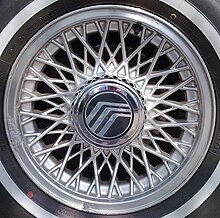This article needs additional citations for verification. (March 2007) |

In the automotive industry, alloy wheels are wheels that are made from an alloy of aluminium or magnesium. Alloys are mixtures of a metal and other elements. They generally provide greater strength over pure metals, which are usually much softer and more ductile. Alloys of aluminium or magnesium are typically lighter for the same strength, provide better heat conduction, and often produce improved cosmetic appearance over steel wheels. Although steel, the most common material used in wheel production, is an alloy of iron and carbon, the term "alloy wheel" is usually reserved for wheels made from nonferrous alloys.
The earliest light-alloy wheels were made of magnesium alloys. Although they lost favor on common vehicles, they remained popular through the 1960s, albeit in very limited numbers. In the mid-to-late 1960s, aluminium-casting refinements allowed the manufacture of safer wheels that were not as brittle. Until this time, most aluminium wheels suffered from low ductility, usually ranging from 2–3% elongation. Because light-alloy wheels at the time were often made of magnesium (often referred to as "mags"), these early wheel failures were later attributed to magnesium's low ductility, when in many instances these wheels were poorly cast aluminium alloy wheels. Once these aluminium casting improvements were more widely adopted, the aluminium wheel took the place of magnesium as low cost, high-performance wheels for motorsports.